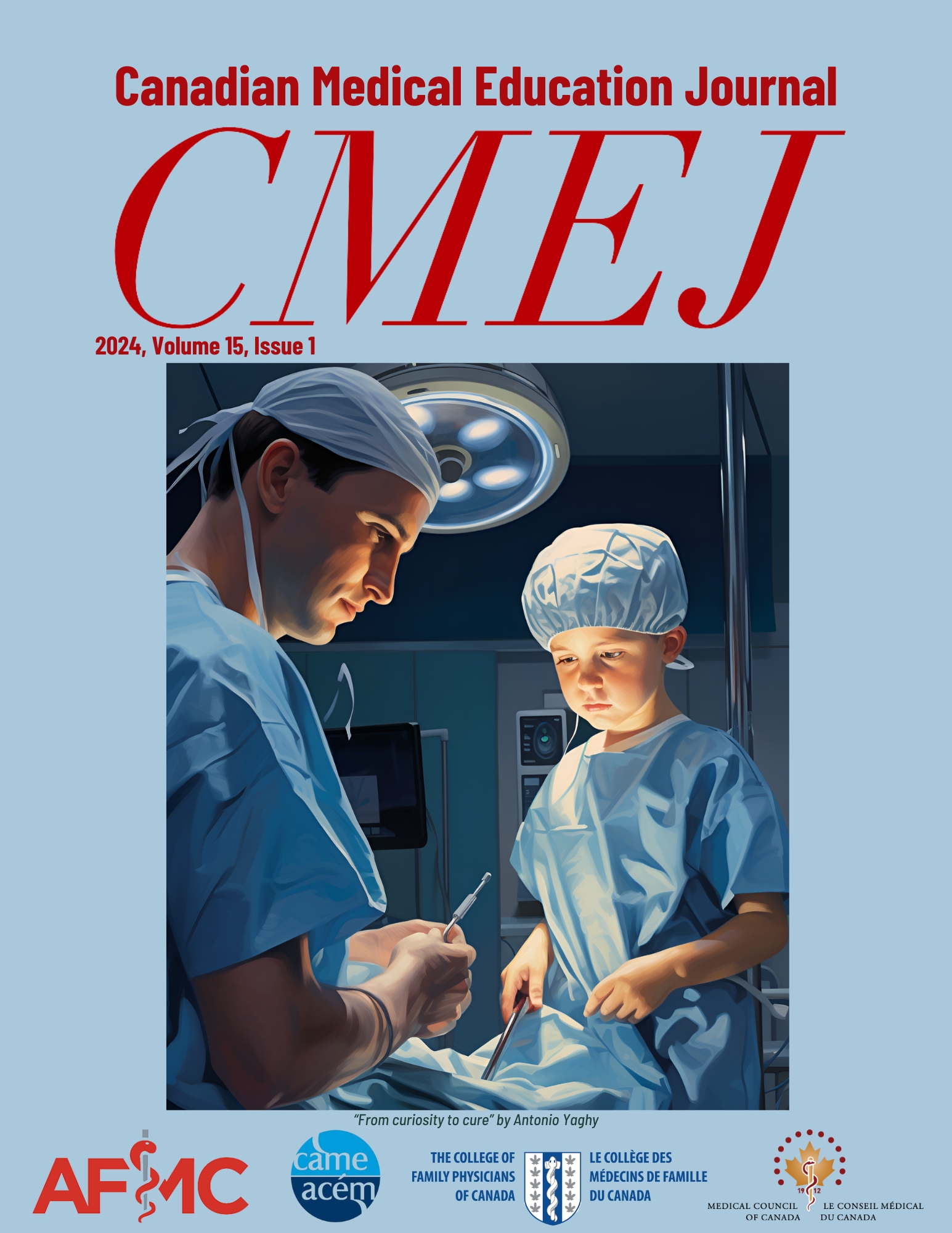The medical school curriculum is not designed for long-term retention: we should stop being alarmed when our learners forget
DOI:
https://doi.org/10.36834/cmej.79004Downloads
References
Slavin S, D'Eon M. Overcrowded curriculum is an impediment to change (Part A). Can Med Ed J. 2021 Sep;12(4):1. https://doi.org/10.36834/cmej.73532 DOI: https://doi.org/10.36834/cmej.73532
D'Eon M, Thompson G, Stacey A, et al. The alarming situation of medical student mental health. Can Med Ed J. 2021;12(3), p.176. https://doi.org/10.36834/cmej.70693 DOI: https://doi.org/10.36834/cmej.70693
D'Eon MF. Knowledge loss of medical students on first year basic science courses at the University of Saskatchewan. BMC med ed. 2006 Dec;6(1):1-6. https://doi.org/10.1186/1472-6920-6-5 DOI: https://doi.org/10.1186/1472-6920-6-5
Mateen FJ, D'Eon MF. Neuroanatomy: a single institution study of knowledge loss. Med Teach. 2008 Jan 1;30(5):537-9. https://doi.org/10.1080/01421590802064880 DOI: https://doi.org/10.1080/01421590802064880
Greb AE, Brennan S, McParlane L, Page R, Bridge PD. Retention of medical genetics knowledge and skills by medical students. Gen Med. 2009 May;11(5):365-70. https://doi.org/10.1097/GIM.0b013e31819c6b2d DOI: https://doi.org/10.1097/GIM.0b013e31819c6b2d
D'Eon M, Crawford R. The elusive content of the medical-school curriculum: a method to the madness. Med Teach. 2005 Dec 1;27(8):699-703. https://doi.org/10.1080/01421590500237598 DOI: https://doi.org/10.1080/01421590500237598
Smith M, Weinstein Y. Six strategies for effective learning. The Learning Scientists Blog. 2016. Available at https://www.learningscientists.org/blog/2016/8/18-1. [Accessed on Feb 20, 2024].
Van Merriënboer JJ, Sweller J. Cognitive load theory in health professional education: design principles and strategies. Med Ed. 2010 Jan;44(1):85-93. https://doi.org/10.1111/j.1365-2923.2009.03498.x DOI: https://doi.org/10.1111/j.1365-2923.2009.03498.x
Green ML, Moeller JJ, Spak JM. Test-enhanced learning in health professions education: a systematic review: BEME Guide No. 48. Med Teach. 2018 Apr 3;40(4):337-50. https://doi.org/10.1080/0142159X.2018.1430354. DOI: https://doi.org/10.1080/0142159X.2018.1430354
Ahmed K, Patel A, Lingard L. Exploring the experiences of Canadian medical students with a background in the arts and humanities. Can Med Ed J. 2024;15(1). https://doi.org/10.36834/cmej.77005. DOI: https://doi.org/10.36834/cmej.77005
Schultz K, Cofie N, Braund H, et al. The hidden curriculum across medical disciplines: an examination of scope, impact, and context. Can Med Ed J. 2024;15(1). https://doi.org/10.36834/cmej.75207 DOI: https://doi.org/10.36834/cmej.75207
Bogaty C, Frambach J. The CanMEDS Competency Framework in laboratory medicine: a phenomenographic study exploring how professional roles are applied outside the clinical environment. Can Med Ed J. 2024;15(1). https://doi.org/10.36834/cmej.77140 DOI: https://doi.org/10.36834/cmej.77140
Bitektine E, Hintermayer M, Chen A, Ko A, Rodriguez C. Medical students’ perceptions on preparedness and care delivery for patients with autism or intellectual disability. Can Med Ed J. 2024;15(1). https://doi.org/10.36834/cmej.76338 DOI: https://doi.org/10.36834/cmej.76338
Maxwell E, Sheppard G, Yi Y. A survey of undergraduate medical students’ knowledge and attitudes about gender bias: the Newfoundland and Labrador perspective. Can Med Ed J. 2024;15(1). https://doi.org/10.36834/cmej.75919. DOI: https://doi.org/10.36834/cmej.75919
Wiper-Bergeron N, Adam HL, Eady K, Moreau KA, Kennedy CR, Kendall CE. Extending social accountability mandates to biomedical research in Canadian faculties of medicine. Can Med Ed J. 2024;15(1). https://doi.org/10.36834/cmej.75425. DOI: https://doi.org/10.36834/cmej.75425
Bondok M, Bondok MS, Law C, Nathoo N, Damji KF. Trends in ophthalmology applicants going unmatched in the Canadian Resident Matching Service. Can Med Ed J. 2024;15(1). https://doi.org/10.36834/cmej.77287. DOI: https://doi.org/10.36834/cmej.77287
Lin JC, Shin C, Greenberg PB. The impact of the medical school admissions interview: a systematic review. Can Med Ed J. 2024;15(1). https://doi.org/10.36834/cmej.76138. DOI: https://doi.org/10.36834/cmej.76138
Dhara A, Fraser S. Five ways to get a grip on teaching advocacy in medical education: the health humanities as a novel approach. Can Med Ed J. 2024;15(1). https://doi.org/10.36834/cmej.75274. DOI: https://doi.org/10.36834/cmej.75274
Larouche P, Sweeney K, Lajeunesse J. Medical escape games: experimenting with a new teaching method. Can Med Ed J. 2024;15(1). https://doi.org/10.36834/cmej.77290. DOI: https://doi.org/10.36834/cmej.77290
Moon H, D’Eon M. A practical model of faculty development in medical education: make it accessible, versatile, and easy to use! Can Med Ed J. 2024;15(1). https://doi.org/10.36834/cmej.77076. DOI: https://doi.org/10.36834/cmej.77076
Sivakumar A, Willows K, Behroozan S, Stairs J. A multilingual sexual and reproductive health animation: a novel educational tool for newcomer patients. Can Med Ed J. 2024;15(1). https://doi.org/10.36834/cmej.77475 DOI: https://doi.org/10.36834/cmej.77475
Pur DR, Samuel A, Sothivannan A, Tanya SM, Nguyen AX. Perspectives on a virtual student-led research conference in ophthalmology. Can Med Ed J. 2024;15(1). https://doi.org/10.36834/cmej.77019 DOI: https://doi.org/10.36834/cmej.77019
Waisberg E, Ong J, Masalkhi M, et al. Apple Vision Pro and the advancement of medical education with extended reality. Can Med Ed J. 2024;15(1). https://doi.org/10.36834/cmej.77634. DOI: https://doi.org/10.36834/cmej.77634
Ruparelia S, Nguyen D-D, Nguyen AX. The utility of the MD extension program in Canadian medical education. Can Med Ed J. 2024;15(1). https://doi.org/10.36834/cmej.77791. DOI: https://doi.org/10.36834/cmej.77791
Mahayosnand PP, Ahmed S, Mora Bermejo D, Sabra Z. COVID-19 lessons learned: public health research should be integrated into medical school curricula. Can Med Ed J. 2024;15(1). https://doi.org/10.36834/cmej.77594 DOI: https://doi.org/10.36834/cmej.77594
Moustafa K. Dismantling discrimination through education. Can Med Ed J. 2024;15(1). https://doi.org/10.36834/cmej.77999. DOI: https://doi.org/10.36834/cmej.77999
Prazeres F. Responses to “On the advantages and disadvantages of virtual continuing medical education: a scoping review.” Can Med Ed J. 2024;15(1). https://doi.org/10.36834/cmej.77943. DOI: https://doi.org/10.36834/cmej.77943
Cheng C, Papadakos J, Umakanthan B, et al. On the advantages and disadvantages of virtual continuing medical education: a scoping review. Can Med Educ J. 2023;14(3):41-74. https://doi.org/10.36834/cmej.75681. DOI: https://doi.org/10.36834/cmej.75681
Neufeld A. A few comments on “Let food be thy knowledge gap: the lack of nutrition education in medical curricula.” Can Med Ed J. 2024;15(1). https://doi.org/10.36834/cmej.78784. DOI: https://doi.org/10.36834/cmej.78784
Esmonde-White C. Let food be thy knowledge gap: the lack of nutrition education in medical curricula. Can Med Educ J. 2023. https://doi.org/10.36834/cmej.76390. DOI: https://doi.org/10.36834/cmej.76390
Yaghy A. From curiosity to cure. Can Med Educ J. 2024;15(1). https://doi.org/10.36834/cmej.78189. DOI: https://doi.org/10.36834/cmej.78189
Downloads
Published
How to Cite
Issue
Section
License
Copyright (c) 2024 Marcel F D'Eon

This work is licensed under a Creative Commons Attribution-NonCommercial-NoDerivatives 4.0 International License.
Submission of an original manuscript to the Canadian Medical Education Journal will be taken to mean that it represents original work not previously published, that it is not being considered elsewhere for publication. If accepted for publication, it will be published online and it will not be published elsewhere in the same form, for commercial purposes, in any language, without the consent of the publisher.
Authors who publish in the Canadian Medical Education Journal agree to release their articles under the Creative Commons Attribution-Noncommercial-No Derivative Works 4.0 Canada Licence. This licence allows anyone to copy and distribute the article for non-commercial purposes provided that appropriate attribution is given. For details of the rights an author grants users of their work, please see the licence summary and the full licence.











